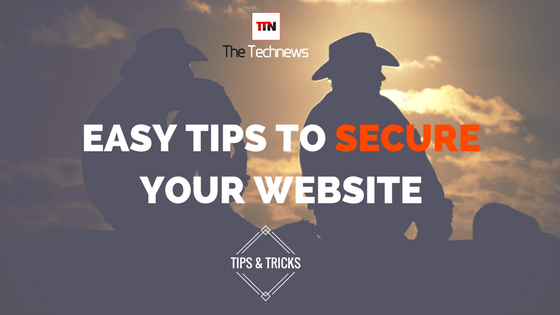Here’s how these 8 easy tips helps you to secure your website by ADEEN LIAHOS. Available from<http://thetechnews.com/2017/06/10/8-easy-tips-to-secure-your-website/> [June 10, 2017]
Imagine you have a safe box and you put all your life’s savings inside that box and left it on the front porch unguarded.
Is it really safe in the safe box?
Absolutely not!
Anyone passing by would be able to pry it open and take all your hard-earned money. This is comparable to creating a website. Think of the website as your savings- all your hard work, creativity, thoughts and money went on this website which you spent hours developing.
Would you keep it unguarded on the front porch? If your answer is no, then here are 8 easy tips from TheTechNews TIPS & TRICKS panel to read that how to secure your website from nasty hackers.
1. KEEP YOUR SOFTWARE AND YOURSELF UPDATED
One of the prime things you should and must do to secure your website is to keep all your software, platforms and scripts that you have installed an update. It may seem pretty “yeah, tell me something I don’t know” fact to you but you will be surprised how often websites are hacked simply because the server operating system or any software running on your websites such as a CMS or forum, is not updated. When website security holes are discovered in software, hackers could sniff it right away to abuse them. The same advice goes for you. You need to keep yourself updated about all the new viruses and hacking techniques so that you could be alert using your website. The link below is an excellent source of such information.
2. HTTPS
You may know HTTPs means Hyper Text Transfer Protocol Secure which means communications between your browser and the website are encrypted. So, HTTPs is a genius initiative that guarantees users that they are talking to the server that they intend to talk to and no third party can intercept or alter the content. As simple as it may sound, it does add tremendous protection to your website and the websites you are entering. Along with that, for a further secured network, you could set up HTTP Strict Transport Security (HSTS) which disallows doubtful HTTP for your whole domain. Online websites like eBay, Amazon, PayPal, even online casinos uses https to secure their users.
3. TOUGHEN UP ACCESS CONTROL
Another simple way to protect yourself is to alter the default database prefix from “wp6y_” to something more complex so that it is hard to guess. Along with that limit, the number of login attempts within a specific range of time and block suspicious users right away. Moreover, login details should never be sent via mail as it is vulnerable to hacking as well. Send it as an SMS or somewhere more private.
4. INSTALL A WEB APPLICATION FIREWALL
Firewall is a god’s sent miracle for the internet. A web application firewall (WAF) is like a guard that checks every data connections passing through your website server. It blocks hackers attempting to carry out the dirty deeds along with that filters out unsolicited traffic identical to spammers and malicious bots.
5. USE PARAMETERIZED QUERIES
One of the major hacking techniques that most sites fall victims is SQL injections. Web form and URL parameters are the most common target for outsiders to supply information. If you leave parameters too open, hackers may easily insert code and hack your database. That would be a massive bummer if that site contains private information like security codes and addresses of the users. What you can do to prevent it is to set up parameterized queries which ensure there is no room for a hacker to work his miracles.
6. LIMIT FILE UPLOADS
One of the easiest way hacker’s plant bugs in your website is through raw files. The most logical solution is to thwart direct access to any uploaded files. You could instead store them outside the root directory and customize a script to access them. That would definitely help you maintain files better.
Other than that, using strong security passwords, better SSL, backing up your file and installing security installations have proved to be useful as well. And lastly, you should always use a website security tool to test your website security on a regular basis. Hopefully caring out these easy steps will enhance your website-owning experience and bring you success!
7. BY HIDDEN OR CHANGING ADMIN PAGES
You know, most of the websites today are developed using WordPress CMS for its growing popularity and ease of use. This is why hackers also try to break down your website and try to hack admin pages to take control of them. So, you may hide its admin pages from the robots.txt file which will disallow and discourage search engines from indexing it. Another way to keep your websites (WordPress CMS) safe from hackers is by changing common admin page URL, which is usually formatted as wp-admin (http://www.example.com/wp-admin) at the end of the login URL.
8. FREQUENTLY BACKUP
Backup is the ultimate solution to any of kind of website owner to keep them safe from hackers. The ultimate asset that you have is your website backup. Any disaster might come anytime, so by taking and keeping backups frequently, it may save your website from an untimely demise. I know it’s horrible to keep backing up something frequently, but by maintaining a time schedule, there are lots of backup services available around you. It is the ultimate failsafe by which you can recover from any disaster.
Here’s how these 8 easy tips helps you to secure your website by ADEEN LIAHOS. Available from<http://thetechnews.com/2017/06/10/8-easy-tips-to-secure-your-website/> [June 10, 2017]

